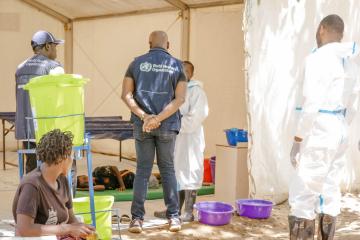Lilongwe – The Government of Malawi through the Public Health Institute of Malawi has declared the end of a protracted Cholera Outbreak, more than two years after the declaration of the outbreak was made on 3 March 2022.
According to the Secretary of Health in the Ministry of Health, Dr Samson Mdolo, the end of outbreak declaration was made in line with Global Task Force on Cholera Control (GTFCC) guidelines following zero reports of cholera in Malawi for more than four weeks.
“The development means all the transmission chains of the disease have been disrupted. The Ministry and working partners will continue being vigilant and support multi -sectoral cholera prevention and control interventions by implementing intensive surveillance and control measures at both community and facility level in affected districts,” he says.
Cholera outbreak was declared a National Public Health Emergency in Malawi on 5th December 2022. Several response activities were implemented, leading to a decline in cases and deaths, and on 5th August 2023, the outbreak was declared as no longer a National Public Health Emergency. The cholera outbreak registered 59,376 cases and 1,772 cumulative deaths, making it the worst cholera outbreak in the Country’s history. The cholera outbreak in Malawi happened in the backdrop of Tropical Cyclone Freddy, which affected 2,267,458 people in the Southern part of the country.
WHO Country Representative Dr Neema Rusibamayila Kimambo commends the leadership of the Government of Malawi in containment of the cholera outbreak and recognizes all partners support to government through all response pillars throughout the outbreak.
“In case management, WHO and partners supported set up of cholera treatment centres and units (CTCs/CTUs) and oral rehydration points (ORPs), provided clinical mentorship and supported development of referral guidelines and standardized patient records from the initial stages of the outbreak. The Surveillance team supported roll out of One Health Surveillance Data Platform, intensified case investigations, and strengthened laboratory testing and event-based surveillance.
A risk communication and community engagement (RCCE) strategy was developed during this period. The RCCE team supported the Tithetse and Tipewe cholera campaigns, oral cholera vaccine (OCV) campaigns and other community engagement activities. Infection prevention (IPC) as well as water and sanitation hygiene (WASH) were reinforced through health facility check lists and supervision visits. Water quality testing was done, and the team supported development of a National IPC Operational Plan.
WHO provided support for OCV campaigns, where over 4 million doses of OCV were administered with utilization rate of almost 100%. With support from AFRO, the OSL team procured supplies worth more than USD 2,000,000, and supported delivery of supplies to the last mile especially in cyclone-affected districts” she states.
Dr Kimambo adds that at the peak of the outbreak in 2023, WHO Malawi led by WHO Africa leadership and rapid response played a significant role in reversing the outbreak. About 65 international Surge experts were deployed by WHO regional office for Africa and headquarters office to support the response. The WCO also recruited 56 Surge staff and supported the government to recruit more than 400 health workers. The WHO country office (WCO) managed to mobilize more than USD 7M from various donors and partners.
Towards the end of the response, Malawi became the first country in AFRO region to utilize the recently updated GTFCC tool to identify priority areas for multisectoral interventions (PAMIs) for cholera control. A timely approach as the country embarks on a roadmap to develop an integrated multi-year multisectoral national cholera control plan. The country also held 5 Zonal and one National After-Action Review with support from WHO and partners. The Malawi WCO continues to work with the Government to implement recommendations from the after-action-review (AAR) and to see the elimination of cholera by 2030.
To strengthen resilience and bolster Global Health Security, in June 2023, WHO conducted a Scoping Mission which led to identification of emergency preparedness and response priorities and development of a 2-year roadmap. WHO continues to work with multi-sectoral partners and the donor community to support implementation of these priorities. In 2024, Malawi WCO has been able to source funds from USAID and FCDO towards preparedness activities and calls on additional and continued multisectoral partner support to the Government of Malawi. The fight against cholera in Malawi can be alluded to collaboration at all levels of intervention.
>>> Read full article>>>
Copyright for syndicated content belongs to the linked Source : WHO Africa – https://www.afro.who.int/countries/malawi/news/malawi-declares-end-cholera-outbreak










